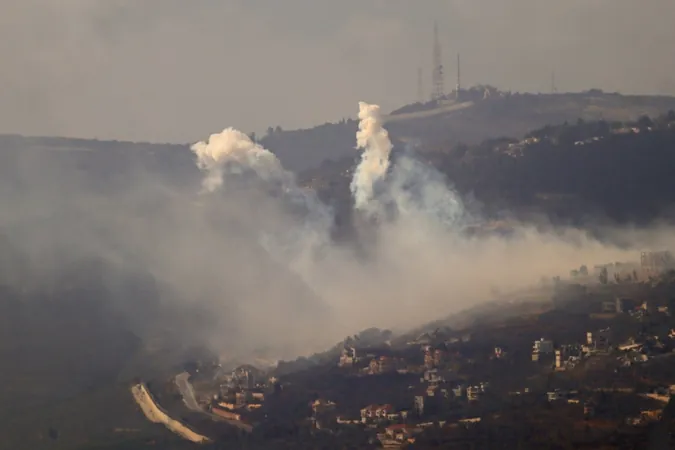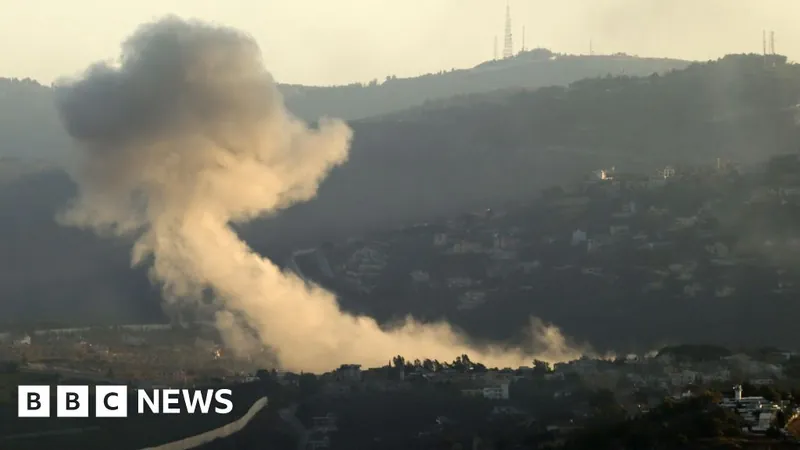
Escalating Tensions: Israeli Raids into Lebanon as U.S. Warns of Iran's Missile Threat
2024-10-01
Escalating Hostilities
In a dramatic escalation of hostilities, Israeli elite forces have initiated limited ground raids into Lebanon, coinciding with missile attacks on Tel Aviv by Hezbollah. This dangerous game of tit-for-tat arises amid the alarming potential of Iran preparing a ballistic missile attack against Israel, as warned by U.S. officials.
Recent Exchanges
The recent exchanges follow weeks of intense Israeli air strikes targeting Hezbollah positions in Lebanon, raising fears of a wider conflict that could potentially draw in Iran and the United States directly. A high-ranking official in Washington confirmed that the U.S. is actively readying support for Israel, emphasizing that a direct assault from Iran would lead to dire consequences for the Iranian regime.
Israeli Military Operations
Israeli forces executed precise operations that included strikes on a high-rise building in Beirut’s Jnah district, as well as targets in the southern suburbs of the capital. Local sources have reported these military actions temporarily disrupted traffic to Beirut airport.
Hezbollah Infrastructure
Israeli military operations have uncovered significant Hezbollah infrastructures, including tunnels and weapons caches, with an emphasis on thwarting plans allegedly devised by Hezbollah to infiltrate Israel. This threat was echoed by Israeli military spokesman Daniel Hagari, who noted the parallels to the devastating Hamas-led attack on October 7, which marked the beginning of the ongoing hostilities.
International Concern
The current wave of violence has prompted international concern, with British Foreign Secretary David Lammy urging Israel to avoid becoming mired in a protracted conflict in Lebanon. The historical animosity between Hezbollah, a group formed by Iran's Revolutionary Guards in 1982, and Israel has been reignited, especially following recent air strikes that have reportedly decimated the leadership of Hezbollah, including the assassination of their chief, Hassan Nasrallah.
Impact on Civilians
In spite of the military's assurances that their operations target Hezbollah and not the Lebanese populace, the reality on the ground paints a dire picture. Thousands of residents have fled southern Lebanon as Israeli air strikes approach. Reports indicate that over 600 individuals took refuge in a monastery after warnings were issued to evacuate by Israeli forces, poised to target buildings suspected of housing Hezbollah militants.
Personal Tragedies
The pain of loss reverberates through local communities. Abdulhamid Ramadan mournfully recounted his tragedy—a civilian building hit by an air strike led to the deaths of his wife and daughter. "My whole life changed in a second," he lamented.
Hezbollah's Retaliation
As tensions escalate, Hezbollah has vowed to retaliate against Israeli incursions, asserting that they have engaged military positions in the Tel Aviv region using advanced missiles. The group's recent deployment of the "Fadi 4" missile, noted for its greater payload and extended range, represents a significant enhancement of their offensive capabilities.
Israel's Plans for a Larger Invasion
Despite claiming recent military successes against Hezbollah, Israel appears poised for a larger-scale invasion of Lebanon, aiming to ensure the safe return of its citizens impacted by ongoing attacks. However, this prospective operation has generated widespread fear and anger across Lebanon.
Public Sentiment in Lebanon
In defiant statements, residents of southern Lebanon proclaim their readiness to resist, asserting that the entire nation stands united against perceived Israeli aggression. Amidst the turmoil, the conflict has claimed over 1,700 Lebanese lives since hostilities erupted on October 8, leading to the displacement of one million individuals.
Looking Ahead
As the situation continues to unfold, the possibility of an all-out conflict looms ominously over the Middle East, raising critical questions about the stability of the region moving forward. Will international diplomacy be able to intervene before this cycle of violence spirals completely out of control? Only time will tell.









 Brasil (PT)
Brasil (PT)
 Canada (EN)
Canada (EN)
 Chile (ES)
Chile (ES)
 España (ES)
España (ES)
 France (FR)
France (FR)
 Hong Kong (EN)
Hong Kong (EN)
 Italia (IT)
Italia (IT)
 日本 (JA)
日本 (JA)
 Magyarország (HU)
Magyarország (HU)
 Norge (NO)
Norge (NO)
 Polska (PL)
Polska (PL)
 Schweiz (DE)
Schweiz (DE)
 Singapore (EN)
Singapore (EN)
 Sverige (SV)
Sverige (SV)
 Suomi (FI)
Suomi (FI)
 Türkiye (TR)
Türkiye (TR)